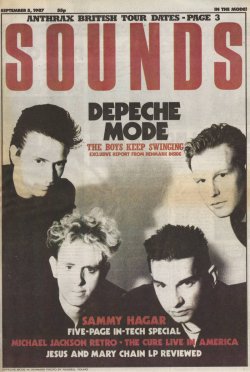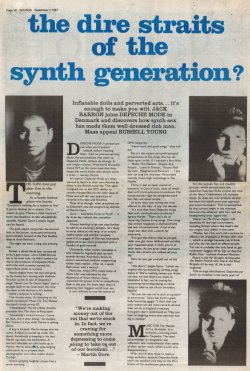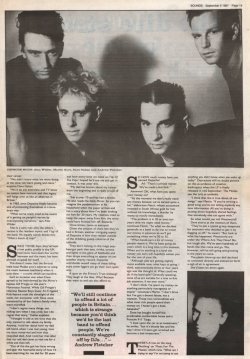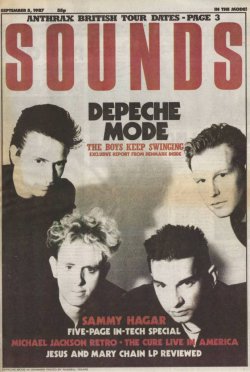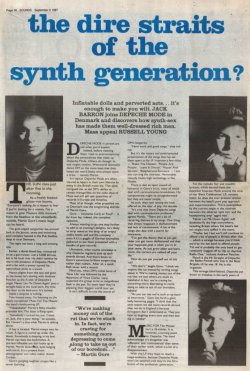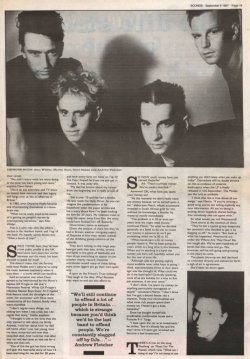You are using an out of date browser. It may not display this or other websites correctly.
You should upgrade or use an alternative browser.
You should upgrade or use an alternative browser.
Depeche Mode The Dire Straits Of The Synth Generation? (Sounds, 1987)
- Thread starter demoderus
- Start date
"Dave has bought himself the predictable comfortable house and a Porsche 911 Targa. “I look upon the car as an investment,” he smiles, “but it’s bloody fast and the way I drive it’ll soon get wrecked and become a bad investment.” "
A fluid and entertaining interview with the band conducted at Puk Studios in Denmark during the end stages of the recording of Music For The Masses. The usual discussion on the nature of the songs and being devalued by the British press, but also their attitude to finance and some interesting and humourous anecdotes. One of the better 1987 articles so far.
Inflatable dolls and perverted acts… it’s enough to make you wilt. Jack Barron joins Depeche Mode in Denmark and discovers how synth-sex has made them well-dressed rich men. Mass appeal Russell Young.
The sun rises just after five in the morning.
As a freshly finished glitter-mix booms, “Everyone’s looking for a reason to live / If you’re looking for a reason, I’ve a reason to give / Pleasure little treasure,” from the beatbox at the wheatfields outside, Martin Gore’s manic laugh can be heard.
The guilt-edged songwriter has arrived back at the jacuzzi, sauna and swimming pool complex housed in the Puk Studios, deep in rural Denmark.
The night has been a long and amusing one.
Earlier, a dumb blond boy, rumoured to be a gun-runner, lost a 5,000 krone bet in his local club. He didn’t believe he was in the presence of Depeche Mode until a fan with a poster turned his supercilious smile into a scowl.
Martin alights from the taxi and goes to the house he’s sharing with Andrew Fletcher as the A-side of Depeche Mode’s single “Never Let Me Down Again” puts a straight back in the local corn. He tries the door to his bedroom. It’s locked.
Inside a surprise is lurking.
Two houses away, I’m listening to the nearly completed “Music For The Masses”, the band’s forthcoming LP.
“Hahahahaha!” Martin’s filthy chuckle precedes him. The door is flung open.
“Somebody’s locked me out. Come on, Jack, this is your doing,” he accuses. But I haven’t a clue what Martin is talking about.
A key is located. Martin romps into his room. A figure is curled up under his duvet. Somebody is sleeping in his bed. Martin rips back the bedclothes. A startled inflatable sex doll looks up at Martin. Martin looks back, eyes bulging with mirth. It’s a present from photographer and video maker Anton Corbijn.
Gore’s gurgling laughter erupts like a sewer bursting.
Depeche Mode in person are not what you’d expect.
Indeed, before meeting them I had no preconceptions about the personalities that make up Depeche Mode. Others do though. In one singles column, Westworld idiotically slated DM on the mere basis that they hated the weird bloke who always wore a dress – namely Martin.
It’s typical. Depeche Mode are often viewed as lepers in their own lifetime by many in the British music biz. That spite intrigued me, as did DM’s ability to remain managerless on the indie ideal of Mute and still sell vast quantities of records in Europe and America.
Most of all though, what propelled me to Denmark was the songwriting abilities of Martin Gore.
Gore – nickname Curly or Poof? – is far from fey; indeed, the complete opposite.
Always wanting to go one step further to add to an evening’s delights, he’s likely to strip naked at the drop of an empty vodka bottle and sod the company – even if it’s a gaggle of German journalists gathered to see them presented with a handful of gold records.
Ultimately, what counts nowadays is why Depeche Mode regularly pick up such awards abroad. And that’s down to Gore’s sometimes brilliant songwriting rather than nudism. After all, a quick flash never sold a record.
Mind you, when DM’s initial burst of “New Life” was followed by the departure of Vince Clarke, many expected the group to be an insignificant flash in the pan. Six years later they’re planning their biggest world tour yet.
It isn’t difficult to cite the secret of DM’s longevity.
“Hard work and good songs,” they tell me.
But it’s the nature and synth / sampled presentation of the songs that has set them apart so far. If I mention a few titles – “Shake The Disease”, “People Are People”, “Leave In Silence”, “Master And Servant”, “Blasphemous Rumours” – I bet you can sing the choruses. Memorable melody meets high technology in the Modes.
There is also an open would of humanity in Gore’s lyrics, many of which deal with communication breakdown. His compositions might be straightforward but they are never simple.
As such, they rank among the best offered on the altar of pop this decade.
“It’s true that many Depeche songs deal with communication problems,” agrees Martin. “There are a lot of recurring themes in my songs. One thing that always reappears is disillusionment and lack of contentment. A lot of the songs also deal with a search for innocence.
“I’ve got this theory that as you get older you get more disillusioned and that your happiness peak is when you’re in your teens. As you grow older and learn more, the corners are rubbed off your life.”
Last edited:
How do you get yourself out of this rut?
“We don’t,” laughs Gore. “I think we exploit the rut instead by writing songs about it. We’re making money out of the rut that we and others are stuck in, hahahaha! In fact, we’re craving for something more depressing to come along to take us out of our boredom, hahaha!
“As you can see we’re such an up band at interviews.” Gore lets forth a giant belly battering giggle. “I think that the only reason we sell more records abroad than we do in England is because foreigners don’t understand us. They just hear us laughing every now and then and dig it, hahaha!”
“Music For The Masses” isn’t a rib-tickler. It is, however, a turning point for Depeche. The band acknowledge it’s altogether less “offensive” and “controversial” than some of their earlier work, which is a bit of a disappointment.
With this LP they hope to reach a mega-audience, because Depeche Mode won’t be satisfied until they’re the Dire Straits of the synthesiser generation.
Yet the melodic flair and maudlin lyricism, which earned them the monicker Depress Mode around the time of the “Black Celebration” LP, remains intact. So does the ever-present tension between the band’s pure pop approach and experimentalism. This is exemplified by the current single in the contrast between the ethereal “Split Mix” and the headspinning amyl “Aggro Mix”.
“Never Let Me Down Again” will doubtless fly sky-high everywhere, including Britain where the band’s last ten singles have stiffed in the teens.
“Maybe, but I bet we’ll still continue to offend a lot of people in Britain after that – which is strange because you’d think we’d be the last band to offend people. Yet we’re probably the only band to get constantly slagged off by DJs on daytime Radio One,” reckons Andrew Fletcher.
Fletch is the Mr Straight of Depeche, the Baden Powell who was in the Boys Brigade till he was 18. He is the organiser.
This strange blind hatred Depeche put down to mistakes in the early years of their career.
“We didn’t know what we were doing at the time, we were young and naďve,” explains Dave Gahan.
“We’d do any interview and TV show no matter how moronic and that legacy still hangs over us like an albatross in Britain.”
In 1983, even Depeche finally became sick of promoting themselves in a lame-brain way.
“What we’ve really tried to be aware of is getting on people’s nerves by over-exposing ourselves,” says Alan Wilder.
Alan is a calm man who the others reckon is the resident mystic and Yogi of the band. He equally calmly denies this: “What a bunch of crap!”
Since those days, they’ve kept a low public profile in the UK. Interviews have been few and far between and the music has been allowed to speak for itself.
This doesn’t mean that the fiercely indie-loyal Modes aren’t averse to using the music business machinery when it suits them – a move which can backfire.
Such an occasion was when Dave agreed to be interviewed by the Mirror’s hapless Gill Pringle at this year’s Montreaux Festival. While Gill Pringle’s infamous Beastie Boys Sneer At Crippled Kids feature took the slimelight of the week, her encounter with Dave went unnoticed by all but Gahan’s family who were mortified.
“I don’t regret many things, not nicking cars when I was a kid, but I do regret that story,” Gahan explains.
“I thought it odd at the time that she only wanted to talk about my family. Anyway, I told her about how my dad left home when I was real young, how me mum remarried and how that (step)dad died. And I told her that after that my real dad came to visit me for a while and then left.
“Out of this she got her facts wrong and spun this heartache story of how I’d been searching for me dad 20 years and how every time we went on Top Of The Pops I hoped he’d see me and get in contact. It was utter shit.
“My dad has known about my career from the beginning and is really proud of me.
“He is over 70 and has had a stroke. He also reads the Daily Mirror. So you can imagine the pandemonium in his household when a paper arrives and has a story about how I’ve been looking for him for 20 years. My relatives tried to keep the paper away from him, the story could have finished him off. Bastards.”
Once bitten, twice as annoyed.
Given the amount of chart hits they’ve had in Britain, another intriguing aspect of Depeche is how they remain outside the dribbling gossip columns of the tabloids.
They don’t belong to the mega pop-beergut pack that eats, drinks, screws and fights in the glare of flashbulbs then drops everything to appear on yet another charity record. Depeche worldwide outsell many of these falling stars come liggers yet go their own quiet way.
A spot on the Prince’s Trust shebang? They laugh at the idea. Why? Because they want to and can also afford to.
So how much money have you earned Depeche?
All: “That’s a private matter. We’ve made a few bob.”
Awwww! OK, what have you spent your money on?
“At the moment we don’t really need any money because we’ve earned quite a bit,” elaborates Fletch, whose accountant invested in South African gold for him without his knowledge, a blunder he wants to rectify immediately.
“The problem is in 20 or even ten years’ time we might need money,” continues Fletch. “So what we decided generally as a band to do was to invest our money in pensions so we’ll get something when we’re 50 or 55.
“When bands earn a lot of money people resent it. We’ve been going six years which is a long time in this business. When you’re working in a band the money you earn will hopefully sustain you for the rest of your life.
“Although jobs are getting slightly more available now, what kept us going, I think, subconsciously three or four years ago was the thought of, What could we do if the band split up? Generally speaking, none of us are suitable for a nine to five job anymore, if we ever were.”
“I don’t think I’ve spent my money on anything particularly outrageous or stupid,” volunteers Martin. “I don’t drive but I’ve got a decent house, not a mansion. Those two commodities are what rich people spend their money on. I haven’t got a boat, hahahaha!”
Dave has bought himself the predictable comfortable house and a Porsche 911 Targa.
“I look upon the car as an investment,” he smiles, “but it’s bloody fast and the way I drive it’ll soon get wrecked and become a bad investment.”
There’s a line on the song “Nothing” on “Music For The Masses” which runs “What am I trying to say / I’m not trying to say anything you didn’t know when you woke up today”. [sic] Detractors will no doubt pounce on this as evidence of creative bankruptcy when the LP is finally released in mid September. The Modes see the lyric as symbolic.
“I think that the line is true about all our songs,” says Martin. “If you’re writing a good song you’re not telling anybody any new information. All you’re doing is putting down hopefully shared feelings that somebody else can agree with.”
So what would you tell Westworld?
Dave snorts at the mention of them.
“They’re just a typical group desperate for attention who decided to get it by slagging us off,” he sneers. “But look at what has happened. Westworld are under the Where Are They Now? File, but tough shit. We’ve seen hundreds of bands like that come and go. We, however, will still be going and growing in the years to come.”
The plastic blow-up sex doll declined to comment directly and instead let forth a sigh of air in agreement.
She’d been let down again.
“We don’t,” laughs Gore. “I think we exploit the rut instead by writing songs about it. We’re making money out of the rut that we and others are stuck in, hahahaha! In fact, we’re craving for something more depressing to come along to take us out of our boredom, hahaha!
“As you can see we’re such an up band at interviews.” Gore lets forth a giant belly battering giggle. “I think that the only reason we sell more records abroad than we do in England is because foreigners don’t understand us. They just hear us laughing every now and then and dig it, hahaha!”
“Music For The Masses” isn’t a rib-tickler. It is, however, a turning point for Depeche. The band acknowledge it’s altogether less “offensive” and “controversial” than some of their earlier work, which is a bit of a disappointment.
With this LP they hope to reach a mega-audience, because Depeche Mode won’t be satisfied until they’re the Dire Straits of the synthesiser generation.
Yet the melodic flair and maudlin lyricism, which earned them the monicker Depress Mode around the time of the “Black Celebration” LP, remains intact. So does the ever-present tension between the band’s pure pop approach and experimentalism. This is exemplified by the current single in the contrast between the ethereal “Split Mix” and the headspinning amyl “Aggro Mix”.
“Never Let Me Down Again” will doubtless fly sky-high everywhere, including Britain where the band’s last ten singles have stiffed in the teens.
“Maybe, but I bet we’ll still continue to offend a lot of people in Britain after that – which is strange because you’d think we’d be the last band to offend people. Yet we’re probably the only band to get constantly slagged off by DJs on daytime Radio One,” reckons Andrew Fletcher.
Fletch is the Mr Straight of Depeche, the Baden Powell who was in the Boys Brigade till he was 18. He is the organiser.
This strange blind hatred Depeche put down to mistakes in the early years of their career.
“We didn’t know what we were doing at the time, we were young and naďve,” explains Dave Gahan.
“We’d do any interview and TV show no matter how moronic and that legacy still hangs over us like an albatross in Britain.”
In 1983, even Depeche finally became sick of promoting themselves in a lame-brain way.
“What we’ve really tried to be aware of is getting on people’s nerves by over-exposing ourselves,” says Alan Wilder.
Alan is a calm man who the others reckon is the resident mystic and Yogi of the band. He equally calmly denies this: “What a bunch of crap!”
Since those days, they’ve kept a low public profile in the UK. Interviews have been few and far between and the music has been allowed to speak for itself.
This doesn’t mean that the fiercely indie-loyal Modes aren’t averse to using the music business machinery when it suits them – a move which can backfire.
Such an occasion was when Dave agreed to be interviewed by the Mirror’s hapless Gill Pringle at this year’s Montreaux Festival. While Gill Pringle’s infamous Beastie Boys Sneer At Crippled Kids feature took the slimelight of the week, her encounter with Dave went unnoticed by all but Gahan’s family who were mortified.
“I don’t regret many things, not nicking cars when I was a kid, but I do regret that story,” Gahan explains.
“I thought it odd at the time that she only wanted to talk about my family. Anyway, I told her about how my dad left home when I was real young, how me mum remarried and how that (step)dad died. And I told her that after that my real dad came to visit me for a while and then left.
“Out of this she got her facts wrong and spun this heartache story of how I’d been searching for me dad 20 years and how every time we went on Top Of The Pops I hoped he’d see me and get in contact. It was utter shit.
“My dad has known about my career from the beginning and is really proud of me.
“He is over 70 and has had a stroke. He also reads the Daily Mirror. So you can imagine the pandemonium in his household when a paper arrives and has a story about how I’ve been looking for him for 20 years. My relatives tried to keep the paper away from him, the story could have finished him off. Bastards.”
Once bitten, twice as annoyed.
Given the amount of chart hits they’ve had in Britain, another intriguing aspect of Depeche is how they remain outside the dribbling gossip columns of the tabloids.
They don’t belong to the mega pop-beergut pack that eats, drinks, screws and fights in the glare of flashbulbs then drops everything to appear on yet another charity record. Depeche worldwide outsell many of these falling stars come liggers yet go their own quiet way.
A spot on the Prince’s Trust shebang? They laugh at the idea. Why? Because they want to and can also afford to.
So how much money have you earned Depeche?
All: “That’s a private matter. We’ve made a few bob.”
Awwww! OK, what have you spent your money on?
“At the moment we don’t really need any money because we’ve earned quite a bit,” elaborates Fletch, whose accountant invested in South African gold for him without his knowledge, a blunder he wants to rectify immediately.
“The problem is in 20 or even ten years’ time we might need money,” continues Fletch. “So what we decided generally as a band to do was to invest our money in pensions so we’ll get something when we’re 50 or 55.
“When bands earn a lot of money people resent it. We’ve been going six years which is a long time in this business. When you’re working in a band the money you earn will hopefully sustain you for the rest of your life.
“Although jobs are getting slightly more available now, what kept us going, I think, subconsciously three or four years ago was the thought of, What could we do if the band split up? Generally speaking, none of us are suitable for a nine to five job anymore, if we ever were.”
“I don’t think I’ve spent my money on anything particularly outrageous or stupid,” volunteers Martin. “I don’t drive but I’ve got a decent house, not a mansion. Those two commodities are what rich people spend their money on. I haven’t got a boat, hahahaha!”
Dave has bought himself the predictable comfortable house and a Porsche 911 Targa.
“I look upon the car as an investment,” he smiles, “but it’s bloody fast and the way I drive it’ll soon get wrecked and become a bad investment.”
There’s a line on the song “Nothing” on “Music For The Masses” which runs “What am I trying to say / I’m not trying to say anything you didn’t know when you woke up today”. [sic] Detractors will no doubt pounce on this as evidence of creative bankruptcy when the LP is finally released in mid September. The Modes see the lyric as symbolic.
“I think that the line is true about all our songs,” says Martin. “If you’re writing a good song you’re not telling anybody any new information. All you’re doing is putting down hopefully shared feelings that somebody else can agree with.”
So what would you tell Westworld?
Dave snorts at the mention of them.
“They’re just a typical group desperate for attention who decided to get it by slagging us off,” he sneers. “But look at what has happened. Westworld are under the Where Are They Now? File, but tough shit. We’ve seen hundreds of bands like that come and go. We, however, will still be going and growing in the years to come.”
The plastic blow-up sex doll declined to comment directly and instead let forth a sigh of air in agreement.
She’d been let down again.

